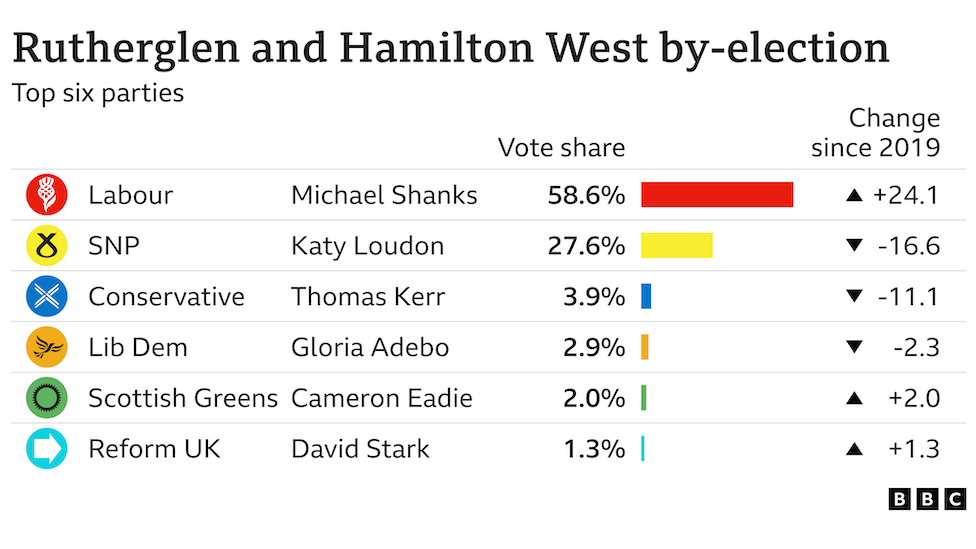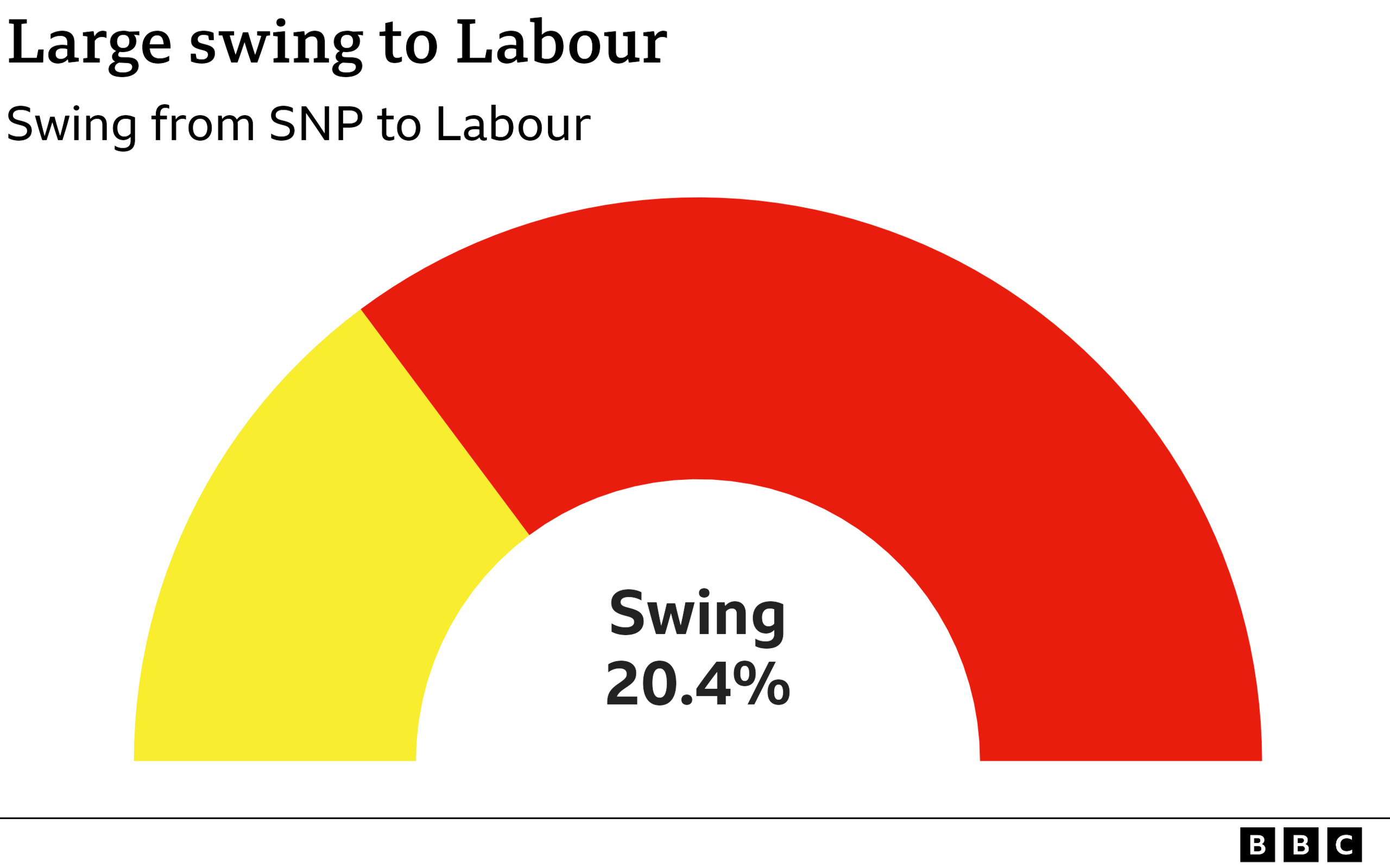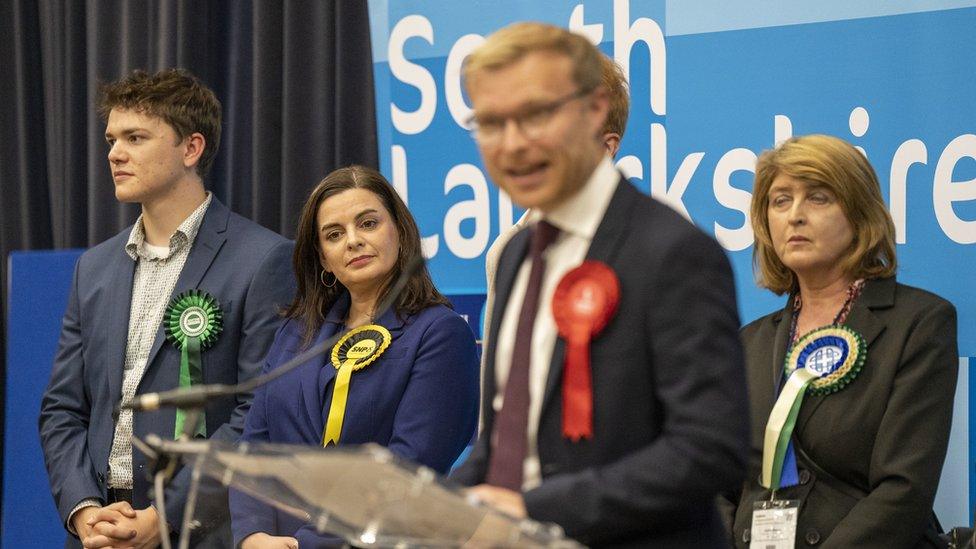Rutherglen and Hamilton West by-election: Does Labour's win signal radical change?
- Published

Michael Shanks celebrates with Scottish Labour leader Anas Sarwar
Labour were expected to win the Rutherglen & Hamilton West by-election - but they had not been expected to win it so well.
Rutherglen was one of the SNP's more marginal seats. Indeed, Labour had narrowly captured it in 2017, only to lose it two years later. It only needed a 5% swing from the SNP to Labour for the seat to change hands once again.
That swing was well below the 11% currently being registered on average by the Scotland-wide polls of voting intention.
Yet in the event the Rutherglen swing was a little over 20%. Labour's own share of the vote increased by 24 points, its best result yet in any Westminster by-election in this parliament. The SNP's support dropped by 17 points.
The result recalled the days before the 2014 independence referendum when Labour routinely took the lion's share of votes and seats in House of Commons elections north of the border.

At 59%, Labour's share of the vote in Rutherglen was only two points adrift of its tally in the constituency in 2010.
And if the swing in the by-election had been replicated in every seat in Scotland, Labour would have matched the 41 seats that the party won in 2010, while the SNP would have been reduced to the rump of six MPs it secured in that election.
Meanwhile, the Conservatives' share in Rutherglen dropped by 11 points to just 4%, the party's worst performance in a Scottish by-election for 30 years.
Although some Conservatives may have made a tactical switch to Labour to help defeat the SNP, it was evidently not a night to be a party in government.

But how much notice should we take of this apparently exceptional result?
Voters often use by-elections to protest against the government (or, in this case, governments) of the day. They can use the opposition to register their dissatisfaction without running the risk of letting the opposition into government.
As a result, by-elections sometimes produce much bigger swings to the opposition than is contemporaneously registered in the polls.
Exaggerated polling?
Most recently, for example, there was a 24% swing from Conservative to Labour in the Selby & Ainstey by-election in Yorkshire, well above the 15 point swing being registered in the GB-wide polls.
So, we should probably be wary of assuming that the swing from Labour to the SNP in any immediate by-election would necessarily be 20% rather than 11%.
Nevertheless, big swings in by-elections are often a harbinger of a radical change to come. And the Rutherglen result certainly dispels any notion that the polls might have been seriously exaggerating the threat that Labour are now posing to the SNP.

Perhaps, as the polls suggest, Labour's tally of seats in any immediate Westminster election would be closer to 20 than 40. That, however, would still represent the biggest reverse for the SNP since the independence referendum.
The SNP find themselves in electoral difficulty even though there is no sign of any decline in support for independence - current polls indicate 49% would vote Yes.
However, around one in six pro-independence supporters are currently saying they will vote Labour.
Whether they stick with Labour or switch back to the SNP could well determine what happens in Scotland in the forthcoming general election.
Sir John Curtice is Professor of Politics, Strathclyde University and Senior Research Fellow, Scottish Centre for Social Research, external and 'The UK in a Changing Europe'. He is also co-host of the Trendy podcast.
Related topics
- Published6 October 2023

- Published6 October 2023

- Published6 October 2023

- Published6 October 2023

- Published6 October 2023
